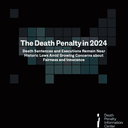A Franklin County, Kentucky, court will hear arguments beginning April 18 to determine whether the state’s lethal injection procedures rise to the level of cruelty that is forbidden by the U.S. and state constitutions. In November 2004, the same court cited questions about the lethal injection process when it issued a stay of execution for Thomas Clyde Bowling, Jr. just days before his scheduled execution. Attorneys for Bowling and death row inmate Ralph Baze, who is also a plaintiff in the lawsuit, now plan to present an anesthesiologist, a pharmacologist, and 18 other witnesses whose testimony will challenge the state’s lethal injection procedures, the drugs used in these executions, and the training of the personnel who carry them out. Currently, Kentucky uses a series of three drugs during lethal injections that are designed to relax and put inmates to sleep before killing them. Bowling’s attorney plans to present evidence that the first drugs do not get into the blood stream before the killing drugs are administered, leading to a “death that is pure torture.” Among the evidence presented will be an autopsy report for Eddie Lee Harper, the state’s first and only inmate to be executed by lethal injection.
(Associated Press, April 14, 2005). Similar concerns about lethal injection were recently raised in a study that was published in the British medical journal The Lancet. See more about this study. See Methods of Execution.



